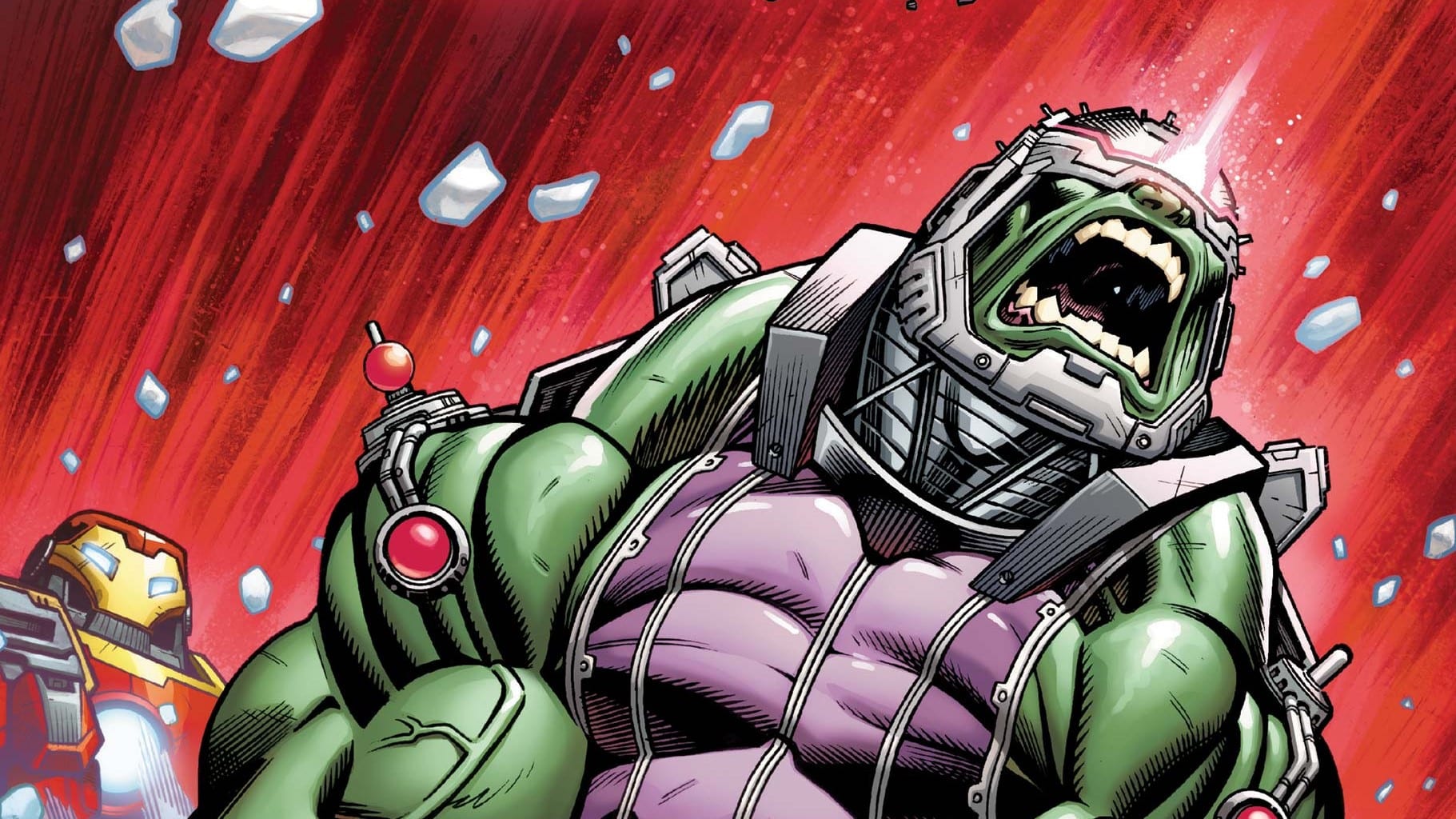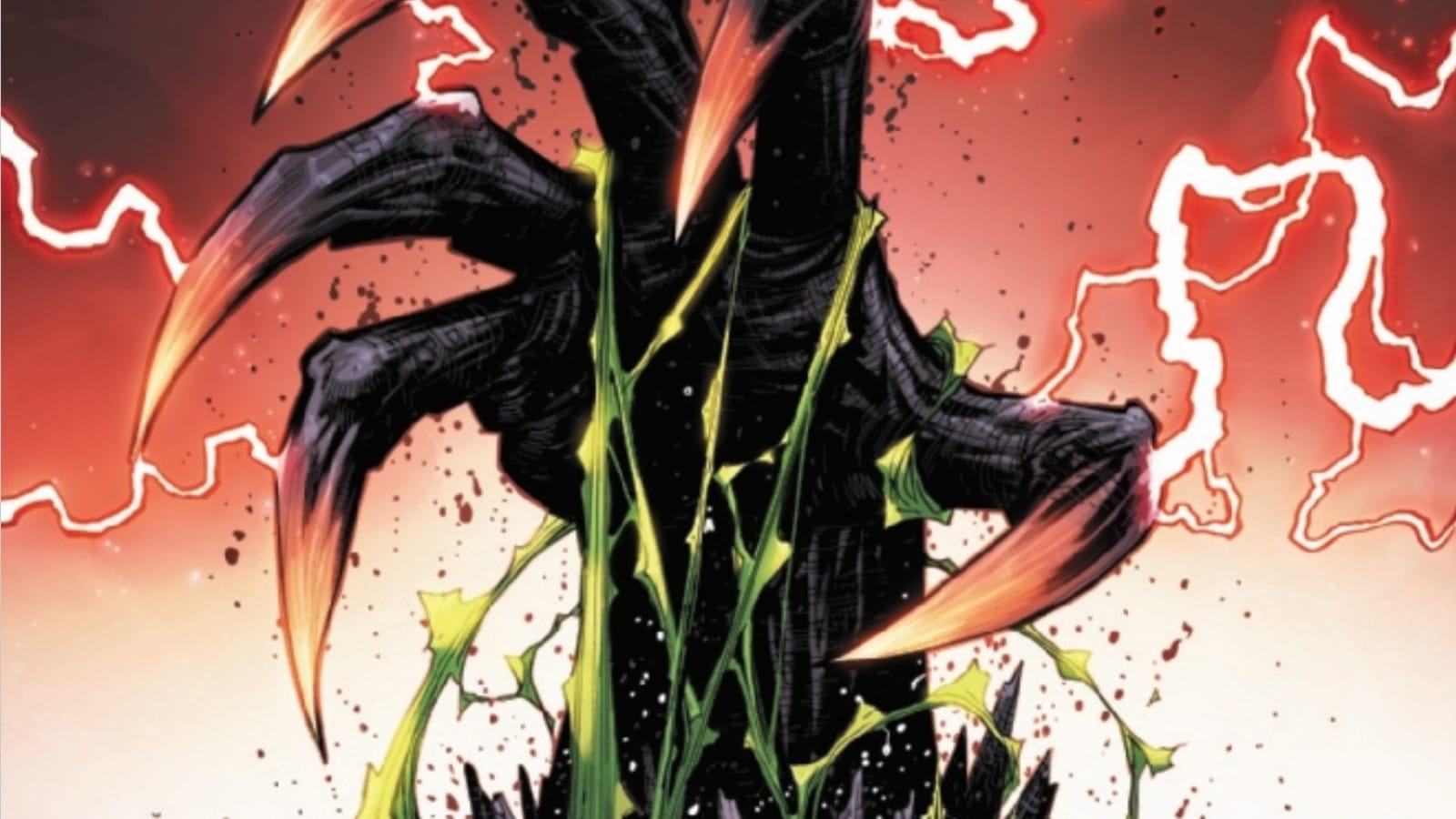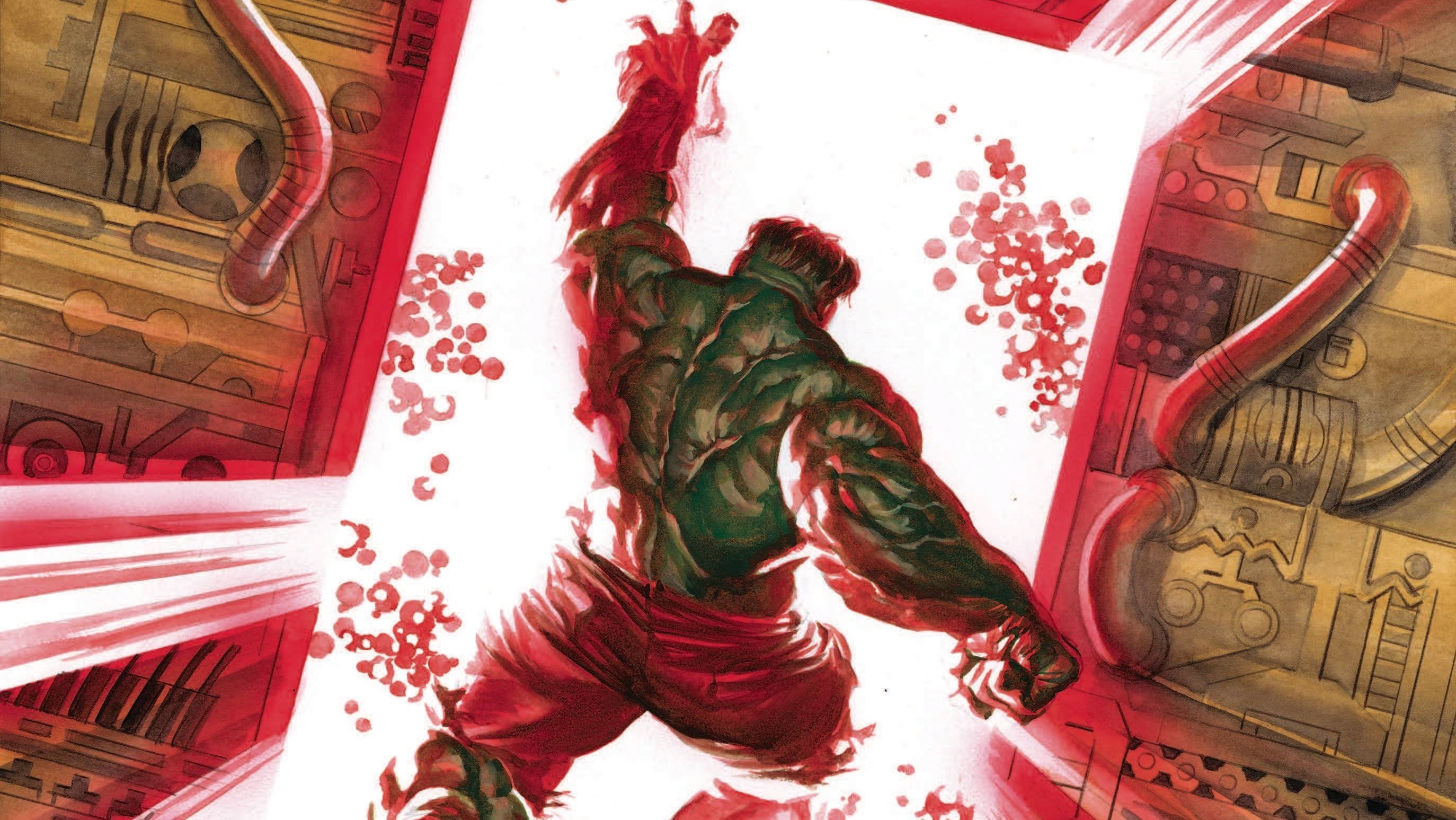Immortal Hulk asked, “Does God have a Hulk?” Hulk #1, by Donny Cates, Ryan Ottley, Frank Martin and Cory Petit, dares to ask the logical next question: What does Hulk need with a starship?
Bear with me for a bit. Before I talk about Hulk #1, I need to talk about a lot of stuff around the issue.
Hulk #1 is a hard comic to write about.

It’s hard, first of all, because I know I risk my social media mentions becoming flooded with Angry Advocates for days on end if I’m not careful in my rhetorical framing. If I want to avoid the wrath of VenomLoverXX69 and LoverOfChainsSince1975, I have two options: I could lie by giving a gushing, glowing review that does not accurately reflect my thoughts on the work, or else I could begin by giving those gentlemen some kind of reassurance, something that might mitigate their fury.
Before I can talk about the issue, I have to talk about Donny Cates.
So:
I like Donny Cates’ writing. I don’t always like every issue of every Donny Cates’ comic, but they tend to win me over by the end of the first arc.
I also need to talk about the human being, because any perceived negativity towards the work of Cates inspires the immediate perception, among the Advocates, that the reviewer must have some kind of grudge against him. Now, I don’t always love how Cates runs his business. For example, I don’t love that he streams with Image execs while those execs refuse to recognize their company’s union. But there, as in nearly any example you might bring forward where Cates Did Something Unpleasant Online, I don’t walk away with some hyper-negative opinion of the dude. I don’t think Cates is some kind of anti-Union activist or anything. I think here, as elsewhere, it’s simpler to attribute this stuff to thoughtlessness, not malice.
So:
I like Donny Cates’ writing, and though I don’t know Donny Cates the human being, I don’t have an overly negative opinion of him as a dude either. He seems like an ok person, (through the skewed and bizarre windows of social media algorithms and comics website interviews). If I thought he was an asshole, I’d either avoid writing about his work, or else I’d enjoy dumping on his work (and the joys of trashing someone truly horrendous would outweigh the annoyance of a VenomLoverXX69’s personal attention). The following discussion is going to arrive at largely negative conclusions, but I hope you can see my goal is not to trash the issue and that I have respect for the craft on display.

The second thing that makes it hard to write about any big new Donny Cates comic is that, as I alluded to above, I don’t tend to enjoy his beginnings. Before I can review this particular beginning of this particular comic written by Cates, I feel compelled to try to express exactly why that is.
It took an arc of Thor and five issues of Crossover to get me on board with those titles. The pattern held for his Venom run. I don’t think there’s a consistent flaw in these openings, but rather a gulf between myself and the target audience. Donny Cates writes opening issues and arcs for the kinds of readers that would be stoked to see Thanos wielding an infinity-bejeweled mjolnir, or the kinds of readers who would get a kick out of pointing to a panel and saying out loud “I know who that character is. That’s Mike Alred’s Madman! From the 1990s!” Think people who might own multiple custom Spawn Funko Pops. Instead, I’m excited to see a Miracleman riff play out with Throg, the Frog of Thunder, or for Steve Murray to hang out with his altar-ego Chip Zdarsky (and I own at least one custom Brideshead Revisited collectible, so I recognize that between the two categories of reader here, I’m the insufferable one). I feel that the first act of a Cates Comic typically is devoted to convincing his core audience that the series is going to be epic, and once he gets past that, the second act is allowed to get weirder. I think above all else, Cates gets what makes superheroes fun, but he’s only able to fully express that fun with the freedom that comes with that second act.
So:
I like Donny Cates comics, or really, I like them eventually, and I expect the same will probably be true of Hulk #1.
The third thing that makes it difficult to talk about Hulk #1 is The Immortal Hulk #1-50 and the various one shots that accompanied that title. Before I can talk about this comic, I have to talk about what preceded it.
The Immortal Hulk revitalized the character after a good decade of reconfigurations and relaunches that struggled to make the character work again as the protagonist of an ongoing comic. Planet Hulk was the major touchstone for the highest point of the character in recent memory, and World War Hulk the logical endpoint. After that, Marvel replaced Bruce Banner with Hercules, with Thunderbolt Ross, with Amadeus Cho, and most recently with Jennifer Walters. In the middle there was a chunk of time when Bruce Banner was around but involved in, as far as I can tell from my limited attempts to waid into that time period, an increasingly convoluted expanded cast of Hulks and Red Hulks and Abominations of various kinds. There was a small period when the Hulk was given a suit of armor and turned into a kind of secret agent/ sentient weapon, and then a period of time where the Hulk developed a new personality who was primarily driven to clean up the mess left behind by the aforementioned Red stories. That was the Hulk’s last major arc before he was killed off: going around and depowering gamma-powered characters so that Marvel’s Earth wasn’t overrun by Too Many Hulks.
Like most successful superhero reconfigurations in recent years, The Immortal Hulk united a superhero story with new genres, themes, aesthetics, and worldbuilding contexts, but all contexts that were in some measure of dialogue with older stories. Hawkeye became a noir, X-Men looked to utopian and dystopian science fiction, and The Immortal Hulk embraced grotesque horror. All three looked at least in part to the problems of capitalism and the failures of our own society, not in any particularly profound way, of course, but in a way that made all three seem a bit more daring than their shelfmates.
I’m reminded of the Totleben, Bissette, Veitch, and Moore run of Swamp Thing, which cemented that title as a space where comic creators could tell weird and unusual tales of horror within a superhero universe; we still see the value of such a space today, as Ram V and Mike Perkins have gone on to achieve immense creative success in that title. Immortal Hulk ended in such a way that Marvel was given the opportunity to explore that same sort of space. The character and status quo were left open enough such that anyone might continue on, not exploring the same themes as the previous volume— Kabbalah and Capitalism— but whatever philosophies, ideas, and societal ills most interested new creative teams.
That didn’t happen. Instead, the new series, advertised as “IMMORTAL NO MORE,” was framed by Marvel as a return to stories about Bruce Banner being set in opposition to the world thanks to the Hulk’s rage, a reset, seemingly, to the Hulk stories of 2006 and the following couple of years.
So:
No matter how potentially fun I find elements of this particular iteration of the Hulk premise— it’s a hoot that the Hulk is now a kind of biological mech with a mind-cockpit piloted Bruce Banner, complete with a lever for rage— I am deeply whelmed by what feels like a leap backward. It’s impossible to say if a back to basics approach was pitched by this creative team, requested by editorial, or mandated by the Murine Powers That Be, those executives that are very invested in Bruce Banner appearances in other mediums in the near future. Whatever the case, this regardless seems to be the most fun, most energetic version of a story that I wish was not being told.

The fourth thing that makes it difficult to talk about Hulk #1 is the aesthetics.
The most visceral shift in The Immortal Hulk’s approach to the character was its visuals. The Hulk became gross, even grotesque. The character felt truly monstrous in a way he very rarely has, and he inhabited a monstrous world. The lens of monstrosity was also, by the end of the run, productively applied to the other characters and superheroes that inhabit the Marvel universe. [Ed. note: That all said, we hope to never see Joe Bennett’s name in a comic again]
If any degree of that aesthetic had been retained here, I’d be far, far more enthusiastic about this next story. The grotesque is suited to the mecha genre; The Hulk meets Neon Genesis Evangelion would make for fascinatingly weird comics. But that does not appear here. Banner has implanted machines in the Hulk’s flesh, but there’s nothing horrifying in their depiction. The Hulk looks like he’s wearing a visor and jetpack; if the dialogue didn’t specify otherwise, it would be easy to mistake this redesign as a return to the baffling Hulk-with-armor days of The Indestructible Hulk. At one point his arm is cut off, dripping green blood, and it is the— I don’t know how else to say this— most PG, family friendly amputation I have seen in comics. The narration tells us that we should fear this Bruce Banner, but when we see his psyche, it’s clean. The Hulk is compared to a starship, but the referent isn’t Event Horizon; it’s Star Trek, the Abrams reboot made orange. The specifics of the narrative could evoke horror, but the visuals reject this at every turn.
So:
Ottley’s action is fun, kinetic; Martin’s blues and his oranges make for, I think, really lovely landscapes. I appreciate above all else those panels that zoom out and refocus on some piece of titanic technology. This world feels immense in its scope. It feels like a superhero comic; but thus far it feels only like a superhero comic, when the expectation has been set for other things. It is not the craft, but the stylistic choices here that leave me cold.

I hope by now you can understand why, taking all these things in, Hulk #1 is a difficult comic to write about. I like the writer; I like the artist; I like the potential the premise has. If I had not started pulling Hulk comics in 2013, if I were totally Hulk-ignorant and you gave me the first trade paperback collection of this story, I’m willing to bet I’d have nothing but utterly glowing feelings for it. If I was able to approach this comic in the abstract, I’m sure I would love it.
And this is why I wanted to write about Hulk #1, because of the gulf between the feelings of that theoretical version of me and my actual feelings reading the comic now, as it actually exists in its own place and time.
There’s a school of thought about criticism I generally favor, that you should judge a work purely on what it attempts to do and how well it succeeds in that attempt. Old was one of my favorite movies of the year, not because it was incredibly high art, but because I felt it accomplished its very particular goals with excellence. I can’t review Hulk #1, however, in the ways I might review Old. I can’t approach the issue and what it attempts to do in isolation, because by its very nature it is not isolated. There is a large #1 on the cover, but the smaller number lets us know that this is the seven hundred and sixty-eighth issue of the book, released one month after the seven hundred and sixty seventh. Superhero fiction is serial fiction, and serial fiction exists in an ever expanding context. The point of superhero fiction is that later stories exist to be read with previous stories. It might be unfair to evaluate this book based on what it does not do rather than what it does, and based on the expectations established by previous issues rather than the expectations it itself seeks to create, but it would be dishonest to treat the book any other way. To treat the book as something out of context is to deny what it is: the next issue of the Hulk title.
The present Thor title succeeds what is widely regarded as either the second or third greatest run of the character, a nearly decade-long epic that used superheroes to explore the nature of divinity, and used divinity to explore the character of a superhero. The most interesting aspects of the present title either dialogue with or build on aspects of that previous run. Thor was made a king, and so Thor now explores the nature of kingship for that character. Thor was defined by the loss of his iconic weapon, and of his worthiness, and here such a loss is explored from a different angle. The deified title of Thor was bestowed on an ordinary human, and the title explored the relationship between god and man. Now the title looks to the human that Thor once was, the human made to be Thor. These aren’t repetitions, but rather steps forward in narrative that become more interesting in the context of what came before.
Venom does much the same; it takes the status quo established by the conclusion of what might be the greatest run in the history of that title and builds on what was accomplished. The concept of “Venom” was expanded to encompass two different kinds of stories that differ radically in scale, and the title works to accommodate both.

We don’t just read these serial stories in context; we read them because they have context, because they build on what came before. The Direct Market Superhero Reader is a serial junky; tv shows and Expanded Cinematic Universes don’t do it for us. They’re far too limited in scope. The only comparable experiences out there are soap operas and pro-wrestling, neither of which are able to approach the breadth of possibilities available in the comics medium.
Hulk #768 is, for me, a person who has read Hulk #767, a significant disappointment, not in skill but in vision. It’s entirely possible that my opinion of Hulk #775 will be significantly higher. Given my history, it’s even very likely. It’s also possible that both the marketing of Hulk #768 and the signposts established in this issue are misleading, that the comic is not trying to return to the Planet Hulk and World War Hulk of our younger days, but will instead substantially build on what the comic accomplished in recent memory.
At the climax of the issue, one character shouts to another, “You have no idea where that will take you!” I hope he’s right.
Robert Secundus is an amateur-angelologist-for-hire.






